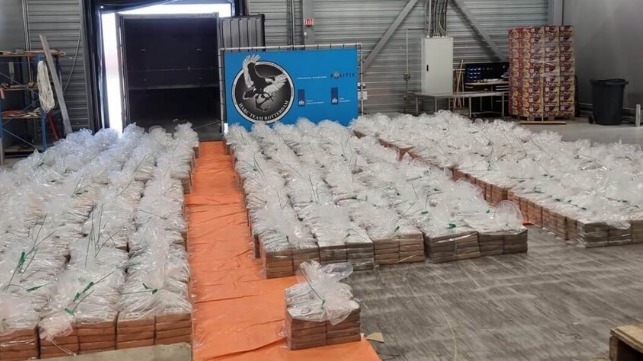EU Launches Effort with Shipping Lines and Ports to Fight Drug Smuggling

The European Commission announced the launch of a new public-private partnership, the European Ports Alliance as the latest step to increase the fight against drug trafficking through Europe’s ports. It comes as Europe has seen a dramatic increase in drug smuggling with accusations that port operations have become overrun by drug cartels.
The European Commission adopted the EU Roadmap to fight drug trafficking and organized crime in October 2023 with today’s launch as the next step in the implementation of the plan. Early in January, after taking its turn at the presidency of the Council of the EU, Belgian outlined an aggressive effort to fight organized crime and drug smuggling.
“Europe has a drug problem – and it is getting worse,” said Paolo Gentiloni, Commissioner for Economy during today’s event in Antwerp. “To tackle the growing inflows of cocaine and other illicit substances into the EU, we need customs, law enforcement, and port authorities to work more closely and more effectively together. That is what the European Ports Alliance aims to do. By bringing together local, national, and European authorities in this public-private partnership, we can pool the expertise and resources needed to tackle this scourge.”
Officials emphasized the scope of the problem by highlighting that more than 300 tonnes of cocaine alone is being seized each year in the EU. In Belgium alone, they set a new record last year with the authorities seizing a record 121 metric tonnes of cocaine at the Port of Antwerp-Bruges, a 10 percent increase from the previous year. Other ports including Rotterdam and in Spain also made significant drug busts with law enforcement warning that the cartels were also using smaller ports to evade enforcement.
Ports the officials said are particularly vulnerable to drug smuggling and exploitations by high-risk criminal networks because of the high volume of traffic through the ports. They highlighted drug trafficking as “one of the most lucrative criminal activities,” with containers being one of the preferred tactics. EU officials said that 70 percent of the drug seizures made by customs take place in ports.
The European Port Alliance focuses on mobilizing the customs community against drug trafficking. They look to support more targeted and effective controls in ports, while also strengthening law enforcement operations in ports and against criminal organizations. They will also seek support and coordination with law enforcement agencies including Europol, Eurojust, the European Public Prosecutor's Office, and through dedicated actions within the European Multidisciplinary Platform Against Criminal Threats.

that matters most
Get the latest maritime news delivered to your inbox daily.
The public-private partnership is also designed to raise awareness among everyone in the industry including shipping companies and support port authorities in their role in the fight against drug trafficking and criminal infiltration. According to the organizers, the effort will focus on identifying vulnerabilities, sharing best practices, and finding practical solutions to strengthen port security. It will address intimidation, corruption, and criminal infiltration in ports, through the implementation of international and EU security standards and cooperation between law enforcement and customs with public and private operators working in the ports.
The launch will be followed by a joint declaration, stating the commitment of law enforcement, customs, and public and private operators working in ports. They are also planning annual meetings at the ministerial level to identify remaining challenges, set strategic priorities, and update on the progress in the fight against drug smuggling.
